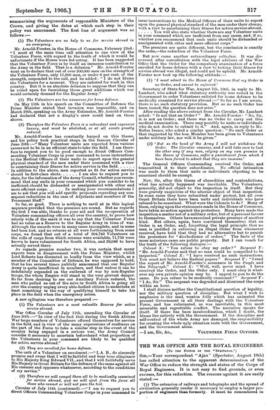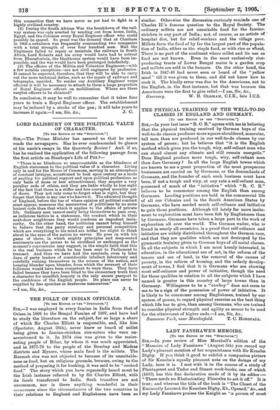[To Tax EDITOR Or TRIO "SPECTATOR:] Snt,—Your correspondent " Ajax
" (Spectator, August 19th) has called attention to the apparent determination of the War Office to reduce the strength and status of the Corps of
Royal Engineers. It is not easy to find grounds, or even excuses, for this reduction. The reasons against it are easily stated :—
(1) The extension of railways and telegraphs and the spread of civilisation generally render it necessary to employ a larger pro- portion of engineers than formerly. It must be remembered in
(2) During the South African War the breakdown of the rail- way system was only averted by sending out from home, India, Egypt, and the Colonies every Royal Engineer officer who could possibly be spared. So great was the demand that at Chatham in 1902 a subaltern was frequently commanding two companies with a total strength of over four hundred men. Had the Engineers failed to repair or maintain the railways in South Africa, Lord Roberts and his army would have had to retreat from Bloemfontein, the blockhouse system would have been im- possible, and the war would have been prolonged indefinitely. (3) The officers of the Militia and Volunteer Engineers—with a few notable exceptions—are not civil engineers by profession. It cannot be expected, therefore, that they will be able to carry out the more technical duties, such as the repair of railways and telegraphs, unaided. To render our Auxiliary Engineer corps efficient it will be necessary to attach to them a large proportion of Royal Engineer officers on mobilisation. Where are these surplus officers to be obtained?
In conclusion, it may be well to remember that it takes four years to train a Royal Engineer officer. The establishment may be:reduced by a stroke of the pen; it will take years to
increase it again.—I am, Sir, &a, J. C.



































 Previous page
Previous page